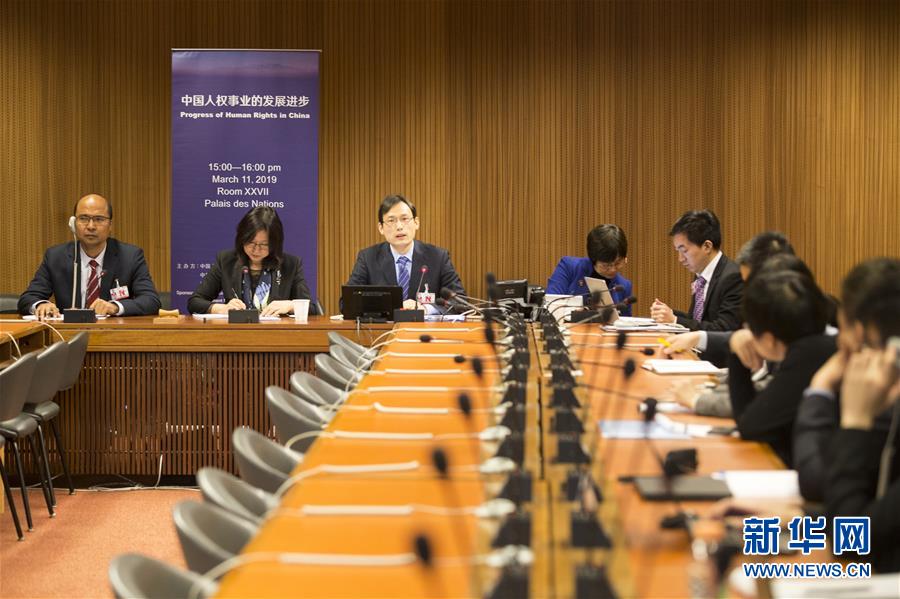.jpg)
Experts attend a side event of the 40th session of the UN Human Rights Council, titled `Progress of Human Rights in China,` in Geneva, Switzerland, March 11, 2019. The side event was held here at the headquarters of UN in Geneva on Monday. Five experts from China shared their observations on how development efforts helped safeguard the rights of the people in China over the past decades at the side event jointly sponsored by the China Society for Human Rights Studies and the Chinese Mission to the UN in Geneva. (Xinhua/Xu Jinquan)
GENEVA, March 12, 2019 -- A side event of the 40th session of the UN Human Rights Council, titled "Progress of Human Rights in China," was held here at the headquarters of UN at Geneva on Monday.
Five experts from China shared their observations on how development efforts helped safeguard the rights of the people in China over the past decades at the side event jointly sponsored by the China Society for Human Rights Studies and the Chinese Mission to UN at Geneva.
Wuji'ahamaiti Tuerxun, president of the Xinjiang Uygur Medical College, shared the story of China attaching importance to the protection and inheritance of traditional medicines of ethnic minorities.
Partly thanks to efforts by the local government, he said, the traditional medicine industry of Xinjiang has witnessed unprecedented development in not only medicine and pharmacy production, but also education and research.
"The medical functions, cultural connotations and tourism added value of the ethnic traditional medicine" have been greatly explored, he said.
People of different nationalities in China have had their distinctive traditional systems of medicine. They are an increasingly cherished heritage.
In a broader perspective, Xiao Wu, a teacher at the Southwest University of Political Science and Law, said at the meeting that the economic and social development in Xinjiang has helped promote human rights greatly.
Over the past 40 years, the per capita disposable income of urban residents in Xinjiang increased from 319 yuan (48 U.S. dollars) to 32,775 yuan (4,885 dollars), while the per capita disposable income of rural residents there increased from 119 yuan (18 dollars) to 11,984 yuan (1,786 dollars), an increase of about 102 times and 100 times, respectively.
"Since the founding of the People's Republic of China, especially since the reform and opening up, the social security rights, the right to health and the right to education and other rights for people in Xinjiang have achieved a qualitative leap," he said.
Zhaluo, a researcher at the China Tibetology Research Center, highlighted the efforts of the Tibet Autonomous Region in ecological protection.
About 34 percent of Tibet's land area has been designated as nature reserves, he said. In addition, the government requires that all types development projects must comply strictly with ecological protection requirements, and the Tibet Autonomous Region has formulated a strict industrial approval system, giving priority to ecotourism and cultural industries so as to reduce environmental damages.
Zhao Shukun, a professor at the Southwest University of Political Science and Law, said China has been actively promoting a healthy Tibet and making efforts to safeguard the Tibetan people's right to health.
Before 1951, she said, Tibet used to be economically underdeveloped, with poor medical conditions, which was reflected in the stagnant population growth for quite a long time.
Now the population of Tibet has increased to 3.37 million in 2018 from 1.14 million in 1951, while the average life expectancy in Tibet has increased from 35.5 years in 1951 to 68.2 years in 2015.
Mao Junxiang, executive director of the Center for Human Rights Studies at China's Central South University, said human rights research and education in China are also flourishing now.
At present there are more than 40 human rights research institutions and hundreds of human rights researchers in the world's largest developing country, he said.
"For China's human rights cause, the vigorous development of human rights research and education is not only a concrete manifestation, but also a contributing factor," he said.

Experts attend a side event of the 40th session of the UN Human Rights Council, titled `Progress of Human Rights in China,` in Geneva, Switzerland, March 11, 2019. The side event was held here at the headquarters of UN in Geneva on Monday. Five experts from China shared their observations on how development efforts helped safeguard the rights of the people in China over the past decades at the side event jointly sponsored by the China Society for Human Rights Studies and the Chinese Mission to the UN in Geneva. (Xinhua/Xu Jinquan)


